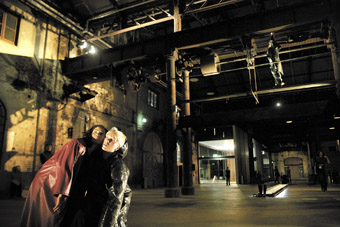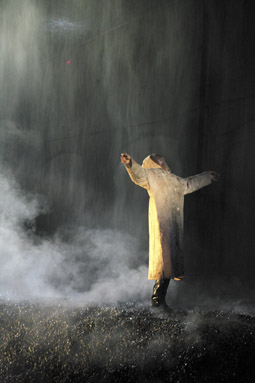a once and future building
jodie mcneilly witnesses the stirring at carriageworks

Henrietta Baird, Tess de Quincey, The Stirring
photo Heidrun Löhr
Henrietta Baird, Tess de Quincey, The Stirring
IN DE QUINCEY CO’S THE STIRRING, THE AUDIENCE MOVES ABOUT A CARRIAGEWORKS BOTH REAL AND IMAGINED. WELL BEYOND THE WATCHING OF PERFORMANCE, WE ARE PLUNGED INTO AN INTERROGATION OF INTERSECTING TEMPORALITIES BOTH MATERIAL AND IMMATERIAL.
The nature of roaming spectatorship precludes engagement with everything performed in the variously titled rooms (Shrine for a Whale, Snort Room etc) and corridors (Kandinsky’s Loop, Long Rails) of this industrial palace. Yet, I am somehow privy to all that happens because of the tangibility of response in movement quality between performers, and the piecemeal dissonance of stories continuously told, repeated in apocalyptic paroxysms or announced with statesmanlike cheer from a manhole.
First, I catch sight of Victoria Hunt’s shrouded body suspended from one of the vertical balusters, rapidly recoiling and arriving at prostrate gestures that loom over Tess de Quincey’s invocations at the mouth of a ‘river’ (lined rails filled with oil). A single motif (straight hand and arm held aloft) by de Quincey registers the relationship between performers. It’s picked up and signaled by Henrietta Baird who is enveloped by Oguri in quiet, quickly paced circles. The scattering of performers from this point is equally marked in the pattern of audience movement.
High in the gantry, Alan Schacher, in scurried motion, screams “There are no angels”, his performance, in distinct contrast to the others, approaching well-formed character. Meanwhile beneath, Baird negotiates another tongue with others not visible. It fills her with a sense of urgency netted by hesitation. Intricate shapes are formed in her hand, her movement punctuated by jumps and sporadic runs halting in stillness. Later she floats like a siren from unfathomable depths while hanging by her ankles—the pained quivering and twitching of the body yielding a striking illusion of beauty. Simple non-mediatised techniques meddle with perception.
In the Snort Room a piece of industrial balustrade precariously swings from a short chain, playing paradoxically with my sense of weight. Further away in the distance three figures in white stand motionless, empty, just there, until the passing of a train jiggles them into animated conversation. It is a vignette powerful in its use of serendipity, and intimate despite the distance.
Inside the Shrine for a Whale room, a huge mound of stones steams steadily. A thin spray of water falls imperceptibly at first until I feel the moisture on my lips and move to another position. Oguri’s hunched being dances effortlessly. His already soiled, hooded white coat sculpts his tiny body and hides his face. He steps cautiously with great delicacy in the unfolding landscape, his head escaping the hood like a mouthing infant finally leading him to climb the obstacle before him. The crunching of stone provides an underscore to the sonic tabernacle of mechanical polyrhythms and noise tectonics composed by Natasha Anderson. The voice of the building participates in the dialogue connecting rooms, notably silencing when the performers do. De Quincey and Oguri join each other briefly. Object composition, incidental shadows and patches of stasis juxtaposed with motion function to displace our beingness in this place, especially through oddities of scale. The dance devolves into the swallowing of Oguri’s shadow by de Quincey’s body.

Oguri, The Stirring
photos Heidrun Löhr
Oguri, The Stirring
The costumes by Lian Loke pronounce the weathering of elements inside this world of water, steel, stone and concrete. They offer material documentation in their exposure to the rolling, pressing and rubbing of the performers. Like wearable flats, the performers seem to use the hooded coats to transit scenes.
The five performers in The Stirring dwell resolutely in the tension between points of definitive arrival and unsettled dissipation. The cheek to cheek duet between de Quincey and Baird is a soothing communion, a reckoning that has all five performers walk toward two drums of bubbling fire in a final potent image. We are invited to stand opposite them. They smile, their hands outstretched. Silence.
The Stirring plumbs the temporal dimension of the CarriageWorks, reconstituting its past, present and possible future ecology with the many palpable languages found onsite.
–
De Quincey Co, The Stirring, concept and direction Tess de Quincey, choreography, performance Tess de Quincey, Henrietta Baird, Peter Fraser, Victoria Hunt, Oguri, Alan Schacher; composer/installation Natasha Anderson, lighting Travis Hodgson, costumes Lian Loke; CarriageWorks, Sydney, Nov 8-17
RealTime issue #82 Dec-Jan 2007 pg. 29






